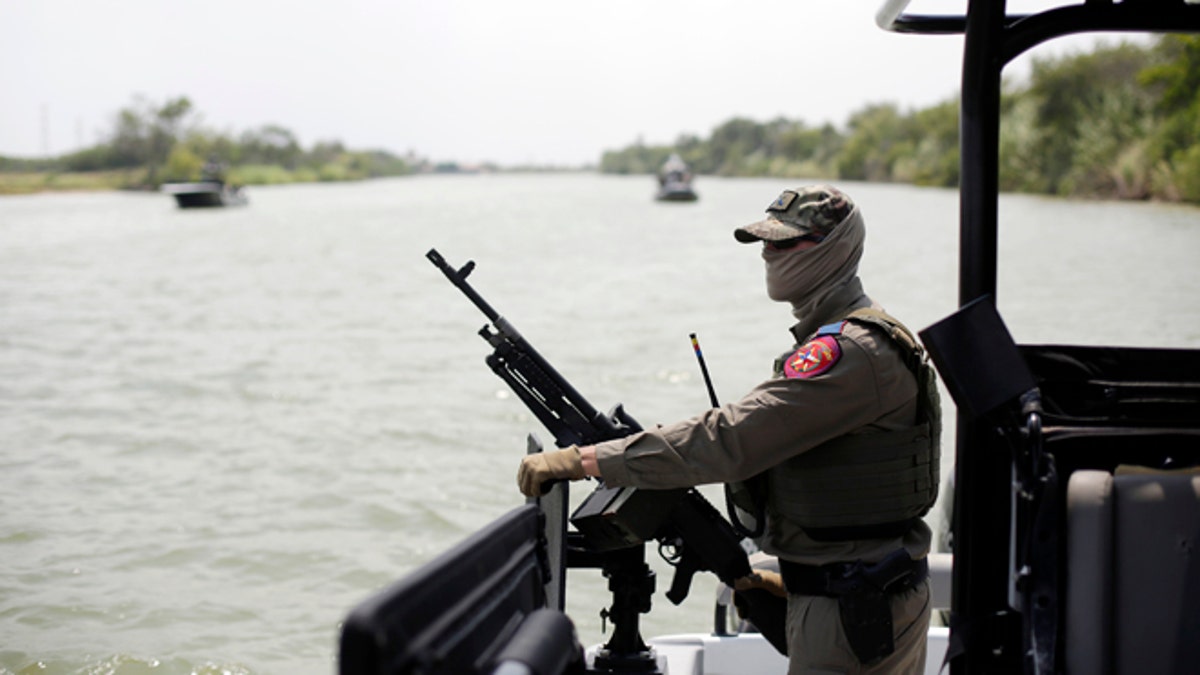
A Texas Department of Safety Trooper patrols on the Rio Grand along the U.S.-Mexico border, Thursday, July 24, 2014, in Mission, Texas. Texas is spending $1.3 million a week for a bigger DPS presence along the border. (AP Photo/Eric Gay, Pool)
MISSION, Texas (AP) – Three heavily armed Texas patrol boats rounded a bend in the Rio Grande on a recent afternoon and came upon two young men paddling an inflatable raft full-speed ahead toward the Mexican shore. The state troopers and game wardens bobbed helplessly in their boats as the men passed their raft and paddles up the bank to others, and a crew of troopers peeked through the tall reeds on the U.S. side for whatever load had just been deposited.
It illustrated the limitations U.S. agencies face in deterring smugglers at the Texas border in the face of Gov. Rick Perry's recent announcement to send as many as 1,000 National Guard troops down.
Combined, the two gunboats from the state's Department of Public Safety and one from the Parks and Wildlife Department carried 2,400 horsepower and 15 .30-caliber machine guns — indisputably the most advanced craft on the Rio Grande.
But they were foiled Thursday by an 8-foot raft and smugglers' scouts who track their movements from the moment the patrols hit water. A short time earlier when the patrol boats passed in the opposite direction, two men — likely scouts — had stood in the same spot holding a fishing net.
Perry termed the latest guard infusion a "deter and refer" mission on Monday; the troops will deter criminal activity and, if they encounter immigrants who have entered the country illegally, they will refer them to Border Patrol.
Since mid-June, Texas already has been paying an additional $1.3 million per week to put more troopers and game wardens in South Texas. The National Guard deployment is expected to cost $12 million per month and they've been told to plan for a year. The soldiers will join the more than 3,000 Border Patrol agents already in the area, plus an unspecified number of state law enforcement officers who've become nearly as ubiquitous in recent weeks.
"We were deployed down here not to deal with the federal immigration part of it," DPS Lt. Charlie Goble said. "We were deployed down here to deal with the criminal element that comes along with it."
So if DPS or the guardsmen encounter immigrants — including children from Central America who've come in droves — they will call Border Patrol, but they will target the smugglers of drugs and people.
It is dangerous work. Already this week, two Texas game wardens have been assaulted while on patrol, Parks and Wildlife Capt. James Dunks said. One on the river was hit in the side of the face with a rock. The other, patrolling the bank, had a 10-minute brawl with a human smuggler who was eventually arrested.
As those incidents suggest, Dunks said smugglers seem more likely to engage with law enforcement than they were in the past. Still, he said, their preference is to do their work out of sight.
"It's a cat and mouse game," Goble said. "We'll counter what they're doing and then they'll turn right around and try to counter what we're doing. ... From the time we launch until the time we recover usually we're being watched. We just continue changing our tactics right along with them.
"Our mere presence out here is the biggest deterrence."
Earlier he said, "We aren't making these arrests daily, but we are seeing a tremendous amount of criminal activity going on."
In the two years since DPS gunboats arrived at the Rio Grande, they have not had to use deadly force. "We were encouraged to make the intimidation factor of these boats overwhelming," Goble said.
But it's not clear whether they have deterred criminal activity on a waterway where they can't possibly be everywhere at once.
"If you look at the straightaway we're in, half to three-quarters of a mile straightaway, regardless of what speed we're travelling, regardless of what speed we're capable of travelling, there is going to be some time to cover that distance," Goble said. "Just as we came around the corner a while ago they spotted us. They can very rapidly get personnel and/or product back to their bank, back to safety."
Follow us on twitter.com/foxnewslatino
Like us at facebook.com/foxnewslatino





















